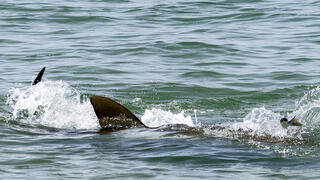In the days since diver Barak Tzach was killed by a shark off the coast of Hadera, the issue of shark attacks has returned to the headlines. Despite their fearsome reputation, experts emphasize that shark attacks remain rare . A new study, published in Frontiers in Conservation Science before Tzach’s death , suggests sharks may bite not only out of competition or hunting instincts, but increasingly as self-defense.
"These bites are simply expressions of sharks’ survival instincts when they feel threatened by human presence," said Dr. Eric Clua, a behavioral ecologist specializing in sharks at the Paris Sciences and Letters University and a lead author of the study. "Sharks should not be viewed as responsible or guilty for such aggression.

" 2 View gallery ( Photo: Will Falcon/Shutterstock ) The study focused in part on French Polynesia, where shark bites have been documented since the early 1940s. Between 2009 and 2023, 74 shark attacks were recorded, four of which were linked to defensive reactions against human actions perceived as aggressive, such as spearfishing or attempts to capture the animals. Typically, there are no warning signs before a shark bite, although injuries are often superficial.
Researchers observed similar defensive behavior among land predators such as bears and large birds like cassowaries, native to New Guinea and northeastern Australia. > "Some coastal shark species, like the gray reef shark, are particularly territorial and bold enough to engage with humans," said Clua. He noted that intrusion into their territory can provoke immediate and forceful defensive reactions.
When sharks act out of self-defense, they may use disproportionate force, sometimes resulting in severe injuries. "We must reconsider the intuitive belief that sharks exercise extreme caution around humans or fear them," Clua said. "The disproportionate response we sometimes see is likely a reflection of their survival instincts — a phenomenon also common among humans.
" 2 View gallery ( Photo: Oded Balilty/AP ) While gathering global data remains challenging, researchers have begun classifying shark bites by motive, using the Global Shark Attack File, which has documented nearly 7,000 shark bites worldwide since 1863. They found that 322 recorded bites could plausibly be linked to self-defense, consistent with the 5% defensive bite rate observed in French Polynesia, suggesting that those findings may reflect global patterns. According to the study, the best way to avoid shark bites is to steer clear of behaviors that sharks might interpret as threatening — even seemingly well-intentioned actions, like trying to assist stranded sharks.
"Physical interaction with a shark, even one that seems harmless or distressed, can be perceived as aggression and provoke an immediate defensive response," Clua warned. "These are powerful wild animals, and maintaining a respectful distance is essential for both human safety and the protection of marine life." >.
Environment

Self-defense attacks: Experts warn to stay out of sharks' space after deadly incident off Israeli coast

Study finds many shark bites are acts of self-defense, urging caution and respect for marine predators after fatal attack off Israeli coast















